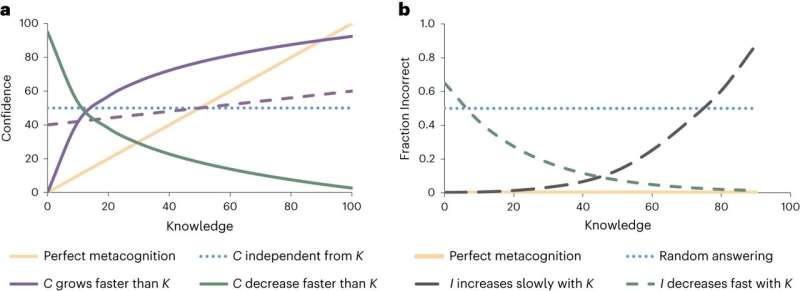This article has been reviewed according to Science X's editorial process and policies. Editors have highlighted the following attributes while ensuring the content's credibility:
fact-checked
peer-reviewed publication
proofread
With little knowledge comes great confidence: Study reveals relationship between knowledge and attitudes toward science

Overconfidence has long been recognized as a critical problem in judgment and decision making.
According to Dr. Cristina Mendonça, one of the lead authors of a new study published in Nature Human Behavior, "Overconfidence occurs when individuals subjectively assess their aptitude to be higher than their objective accuracy [and] has long been recognized as a critical problem in judgment and decision making. Past research has shown that miscalibrations in the internal representation of accuracy can have severe consequences but how to gauge these miscalibrations is far from trivial."
In the case of scientific knowledge, overconfidence might be particularly significant, as the lack of awareness of one's own ignorance can impact behaviors, pose risks to public policies, and even jeopardize health.
In the study published today, researchers examined four large surveys conducted over a span of 30 years in Europe and the U.S., and sought to develop a novel confidence metric that would be indirect, independent across scales, and applicable to diverse contexts.
The research team used surveys with the format "True," "False," "Don't know" and devised a ratio of incorrect to "Don't Know" answers as an overconfidence metric, positing that incorrect answers could indicate situations where respondents believed they knew the answer but were mistaken, thus demonstrating overconfidence. In the words of Dr. Mendonça, "This metric has the advantages of being easy to replicate and not requiring individuals to compare themselves to others nor to explicitly state how confident they are."
The results revealed two key findings. First, overconfidence tended to grow faster than knowledge, reaching its peak at intermediate levels of knowledge. Second, respondents with intermediate knowledge and high confidence also displayed the least positive attitudes towards science.
According to André Mata, one of the authors of the study, "This combination of overconfidence and negative attitudes towards science is dangerous, as it can lead to the dissemination of false information and conspiracy theories, in both cases with great confidence."
To validate their conclusions, the researchers developed a new survey, quantitatively analyzed the work of other colleagues and used two direct, non-comparative metrics of trust, which confirmed the trend that trust increases faster than knowledge.
The implications of these findings are far-reaching and challenge conventional assumptions about science communication strategies.
According to the study coordinator Dr. Gonçalves-Sá, "Science communication and outreach often prioritize simplifying scientific information for broader audiences. While presenting simplified information might offer a basic level of knowledge, it could also lead to increased overconfidence gaps among those with some (albeit little) knowledge. There is a common sense idea that 'a little knowledge is a dangerous thing' and, at least in the case of scientific knowledge that might very well be the case."
Thus, the study suggests that efforts to promote knowledge, if not accompanied by an equivalent effort to convey a certain awareness of how much remains to be understood, can have unexpected effects. It also suggests that interventions should be targeted at individuals with intermediate knowledge, since they make up the majority of the population and tend to have the least positive attitudes towards science.
Nevertheless, the researchers caution that their confidence metric might not generalize to topics outside of scientific knowledge and surveys that penalize wrong answers heavily. The study also does not imply causality, and individual and cultural differences were observed.
Overall, this paper calls for further exploration of integrative metrics that can accurately measure both knowledge and confidence while considering potential differences in constructs.
More information: Lackner, S. et al. Intermediate levels of scientific knowledge are associated with overconfidence and negative attitudes towards science, Nature Human Behavior (2023). DOI: 10.1038/s41562-023-01677-8 www.nature.com/articles/s41562-023-01677-8
Journal information: Nature Human Behaviour
Provided by LIP




















